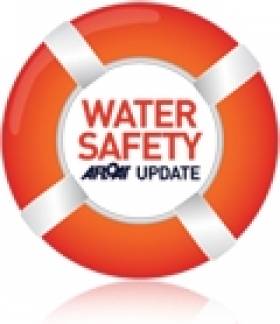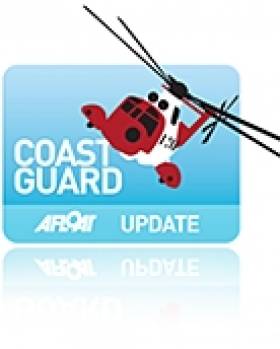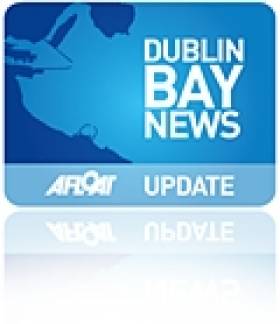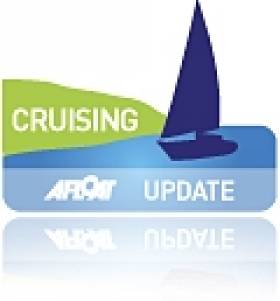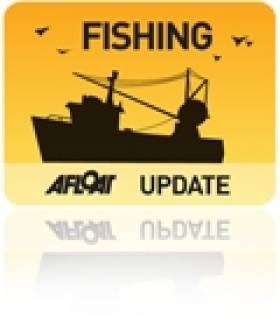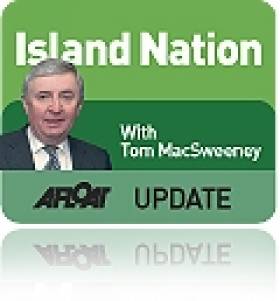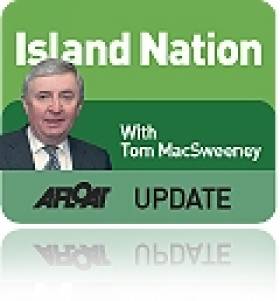Displaying items by tag: Department of Transport
Updated List of Approved Liferafts for Small Fishing Vessels
The Department of Transport's latest marine notice adds two more classes of liferaft to those deemed acceptable for use on small fishing vessels that do not require SOLAS/MED approval.
The list of accepted four-person inflatable liferafts (all with SOLAS Pack) now includes the following: DSB; RFD Surviva; RFD Seasava; Viking DK; Zodiac; Eurovinyl ISO/DIS 9650; Sea-Safe ISO 9650-1 Group A Type 1; and Seago ISO 9650-1.
Vessels affected by this notice are those less than 40ft (12m) in length and carrying four or fewer persons.
Spending the Day with the Howth Coast Guard
The Government news service MerrionStreet.ie recently paid a visit to the Howth Coast Guard unit to see some of its 24 volunteers train on the water and cliffs.
Cliff rescue forms a major part of the work done by the Howth unit, so regular searches of the coves around the coast on Howth Head and training of new volunteers are are a must.
Their work is co-ordinated by staff at the new National Coast Guard Centre at the Department of Transport, which manages nearly 1,000 volunteers across 54 units nationwide.
MerrionStreet.ie has more on the story HERE.
Dublin Cycle Route Extension Put On Hold
The planned connection of Dublin's main coastal and canal cycling routes has been put on hold following "intensive lobbying", the Dublin Observer reports.
Planning permission had already been granted by Dublin Ciy Council for the completion of the €10m project to connect Portobello and the Grand Canal with East Wall Road via the Docklands.
But the council is now "re-evaluating" the section between Docklands and Fairview Park following complaints from East Wall residents, prompting the suspension of €4 million of funding by the Department of Transport.
Council officials and councillors have also apparently disagreed on what public consultation had happened with residents in the East Wall area regarding the cycle route.
Fine Gael Cllr Naoise Ó Muirí has argued that the "rationale for the strident opposition from within East Wall seemed pretty flimsy at best".
The Dublin Observer has more on the story HERE.
Irish Vessels Require Communications Licence
In order to comply with these regulations, Ireland accepts the following documents as meeting the requirements on board its vessels:
To view the regulations in greater detail logon HERE
Cruising School No Longer Operating in Irish Waters
South East Cruising School is no longer operating in Irish waters and in a letter to Afloat magazine, Principal Charlie Kavanagh, outlined his reasons for closure. The letter is reproduced below. The Marine Survey Office (MSO) was offered a right of reply but to date we have had no response.
Sir,
Having operated my business, South East Cruising School, under the auspices of the Irish Sailing Association for the last 14 years, I am very sorry to say that due to adverse circumstances, I now find that I can no longer operate in Irish waters.
In that time, I have assisted well over a 1,000 sailors to learn about our sport and improve their skills in a safe environment. I would like to take this opportunity to say thanks to each and every one for their custom and friendship over the years.
I recently submitted my boat for inspection under the Commercial Sail Passenger Boat Regulations and the Marine Survey Office (MSO) conducted an initial survey last May, which has completely stalled over a number of issues. As it is my opinion that these matters will not be resolved amicably, I have no choice but to suspend things for now and look at other options.
For those of you not familiar with the process, the Department of Transport's MSO has drawn up a set of Regulations that, in my opinion, do not help to promote safer sail training.
They have refused point blank to consider adopting the UK's MCA Code of Practice, administered by the RYA, the world leaders in most matters relating to sail training and from whom I hold my Yachtmaster Instructor qualification.
Five years ago, we had close to 15 schools offering cruiser sail training, but this is now down to five or six, and it's unlikely any more will get through this process without severe cost to themselves and the security of their boat(s).
Also, to the best of my knowledge, we have no powerboat school for those wishing to learn big boat power handling. Not content with banishing Asgard II to remain in her watery grave, cruiser sail training in Ireland is fast being sunk by the State too, as it reduces the number of outlets that teach safe practices to the general public wishing to go to sea in our island nation.
In 1997, I set out to operate my school under the watchful eye of Paddy Boyd of the ISA and subsequently Tony Wright, both of whom worked hard to aid and supervise us under the ISA Cruising Scheme. My thanks go to them and all in the ISA for their help over the years. It is with a heavy heart that I have to let go of my dream, having suffered the highs and lows over the years, but 2010 has been a nightmare, thanks to the MSO.
As an Irish taxpayer and committed community person, I - like many others in the commercial marine community - am disgusted at the State's attitude towards sailing and the sea.
Yours in Sailing,
Charlie Kavanagh,
ISA/RYA Yachtmaster Instructor
New Safety Regs Anger Fishermen
Counting the Cost of New Fishing Boat Regulations
The cost of upgrading fishing boats to comply with new regulations first mooted three years ago means some boats cannot put to sea again. It's a move that will cost hundreds of jobs to coastal communities says Tom MacSweeney
The nation may be reeling from the revelations about Anglo Irish Bank and AIB. The fishing industry is reeling from another shocker. While earlier this week it cranked up its PR machine in an attempt to convince the public it was going to create jobs, the reality is that this Friday, October 1, it wiped out at least 200 and the overall effects of what it has done may throw as many as 800 people out of work in coastal areas.
That is callous disregard for people and underlines the disinterest and disrespect which the Government has for the maritime sector.
These jobs are in the fishing industry and are being lost because of a decision by the Department of Transport that smaller fishing boats, ranging in size from 15 to 24 metres must conform to the same safety standards as bigger boats, those over 25 metres, even though they operate under different fishing methods.
There can be no argument against safety, but there should be moderate, reasonable implementation of regulations. To quote the Taoiseach in his own recent defence, "moderation in all things." There are 99 boats in the Irish fleet in the 15-24 metre category. These are, effectively, day boats which operate in inshore waters, close to land. The Department has decided to implement regulations requiring them to conform to the same standards as bigger vessels that operate farther out to sea for extended periods.
Of the 99 boats nationwide faced with the implementation of the new regulations, 39 have not applied for certification, apparently because owners could either not afford the costs of upgrading the boats to the higher standard or felt the vessels would not be able to meet those standards, irrespective of how much money was spent on them. Those 39 boats have to be tied up, unable to go fishing any longer, another blow to the Irish fishing fleet. Their owners and crews will face unemployment.
The total number of jobs lost nationally could be up to 800, according to fishing organisations, when those whose livelihoods ashore depend on the 200 direct fishing jobs are added.
The Department makes the point that it has been known for three years that these new regulations would be imposed and that there has been ample time for owners to upgrade. Fishing organisations asked the Minister for Transport, Noel Dempsey, who also holds the brief of marine safety, to establish a separate category of safety requirements applying specifically to the smaller boats. Dempsey, who has not been a friend of the fishing industry, refused. So around 200 fishermen are out of work, directly due to a Government decision. It has not been explained why different regulations cannot be applied to different sizes of boats.
The sight of more Irish fishing boats tied to the quay wall, stopped by Irish Government regulations from working will not be pleasant.
• This article is reprinted by permission of the CORK EVENING ECHO in which Tom MacSweeney writes maritime columns twice weekly. Evening Echo website: www.eecho.ie
Sailing Body Challenges Government
The Irish Sailing Association has told the Government that Ireland is being left behind in marine development because of the way the State has neglected the maritime sphere. I applaud the national sailing authority for making it clear that while other countries are capitalising on their natural marine assets in coastal and inland waterways, Ireland is being left behind at a significant cost to the State in lost revenue and employment opportunities.
Irish sailors have raised the profile of the sport worldwide, the Volvo Race in Galway brought international attention to Irish sailing, but the Government has failed to capitalise on this sporting success. The ISA has offered a three-year development strategy to the Department of Transport, one of five Government Departments with marine responsibility.
"As we see a decline in some of the traditional marine-related industries," says the ISA, "there is an opportunity to develop the maritime recreational sphere, to grow and attract employment opportunities in rural areas that are struggling and bring significant national and international revenue if there is greater investment in marine leisure infrastructure."
Having been advised to do so at its national conference earlier this year, the national sailing authority has also reviewed its own operational structures. From next month it will put more emphasis on providing regional support for clubs and training centres, as well as improving communications with the membership.
Two Regional Development Officers have been appointed. Denis Dillon who has been Motorboat Development Officer is taking up the role of Regional Development Officer for the Southern Region. He will work with clubs, training centres, local authorities and local sports partnerships to increase interest in sailing. Ciaran Murphy is joining the ISA as his counterpart for the Northern Region which will include Dublin. Pamela Smithwick, who has been the ISA's "Women on the Water Development Officer," is taking responsibility for club membership and liaison. Rachel Solon, the Association's Training Administrator, has been assigned the role of Communications Officer.
Harry Hermon, ISA Chief Executive, anticipates the changes will "raise the profile of the sport, resulting in a significant increase in people participating in club and training centre activity. Our aim is to increase interest amongst the wider boating community and the general public."
The Association's strategy document tells the Department that more boating usage by the public should not be restricted by unnecessary regulations, which should only be imposed where "necessary, appropriate and enforceable."
While safety must always be uppermost in sailing, there does come a time when people must take responsibility to look after themselves. The Department has not helped the sport by regulation of short-handed, single-handed sailing in Irish waters, unique in world sailing and imposed without reasonable consultation.
It is good to see the ISA standing up for the sport and its document points to what I believe is a core problem ... "As there is no longer a Department of the Marine, we have in recent years seen marine leisure interests fragmented across different Government Departments which include, Transport, Sport and Tourism, Environment, Agriculture and Fisheries and Education. The result is that there is little or no co-ordinated strategy to promote or develop the sector.
"As an island nation we have undoubtedly some of the best coastline and waterways in the world. Where other countries are capitalising on their natural assets, Ireland is being left behind at a significant cost to the State in lost revenue and employment opportunities."
A greater political awareness of the potential of sailing as a significant contributor to the economic is needed. The ISA says this requires education and awareness programmes to raise interest.
These are good proposals but Departmental bureaucrats sitting on their fat salaries, behind desks which have never felt the roll of the sea, will not like being challenged, so they may ignore the ISA.
The full ISA submission is below as a downloadable PDF.
• This article is reprinted by permission of the CORK EVENING ECHO in which Tom MacSweeney writes maritime columns twice weekly. Evening Echo website: www.eecho.ie



























